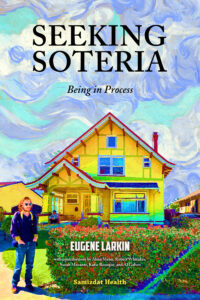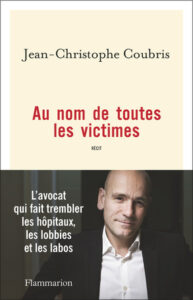
Samizdat has just been graced with Gene Larkin’s Seeking Soteria accompanied by Bill James fabulous artwork (graced is the best word). For reasons that will become clear, the title of this post picks up on the last post Unsafe Safety.
Gene can be heard talking about Soteria with colleagues on a Mad in America Soteria Webinar. In the near future Katinka Newman will be hosting him on her podcast. Here are some reviews and further leads below.
Through vivid storytelling, Larkin traces his journey from a Catholic working-class upbringing in the Midwest, through disillusionment and self-discovery in Brazil, to the heart of a groundbreaking experiment in healing schizophrenia without medication. What emerges is not just a personal narrative, but a call for trust, presence, and radical empathy in the face of madness. Seeking Soteria is a powerful testimony to what’s possible when we choose trust over fear, being over fixing, and humanity over systems.
Reviews
Eugene Larkin has created a superb and moving memoir of Soteria’s powerful simplicity…actively being with another in pain, not running, not rushing, not fixing. Highly recommended, especially for practitioners who all too frequently feel lost about what to do when their standardized treatment protocols fail.
Chuck Ruby – author Smoke and Mirrors: How You Are Being Fooled about Mental Illness
Inspired by Ronald Laing’s Kingsley Hall, Soteria House was a daring experiment in the treatment of those problems with living usually called “mental illnesses” with kindness, empathy and compassion. This was all part of a long-standing tradition of humanistic psychiatry going all the way back the Eighteenth Century (before the term “psychiatry” was even invented) but one which has been all but forgotten.
In elegant, poetic prose, author Eugene Larkin tells the story of his own involvement with Soteria House, more than fifty years ago — a tale told with grace, compassion, and humility. In an era in which increasingly large amount of the human condition are classified as drug-treatable brain diseases, his is a story which needs to be shared as widely as possible.
Patrick Hahn author of Obedience Pills and Prescription for Sorrow
In Seeking Soteria, Eugene Larkin takes readers back inside the Soteria Home that existed in the 1970s, bringing that ‘therapeutic’ space alive, telling both of its joys and challenges, and of his ‘being with’ those we call mad.
Robert Whitaker, author of Anatomy of an Epidemic
Simply said Seeking Soteria is a gem. Eugene Larkin’s writing style is pure delight. Through the telling of his story, we learn about the magic of Soteria House—the compassionate treatment of people diagnosed with schizophrenia. The Soteria study was a very successful program in the 1970s, and this book puts you right there. Whether you already know about Soteria House and want to learn what it was really like, or are just somebody interested in the human condition, Seeking Soteria is for you.
Jim Gottstein, author of The Zyprexa Papers
In Seeking Soteria, Eugene Larkin, has quietly but powerfully described the challenges of helping people who are coping with ‘extreme mental states’ feel safe and protected in a therapeutic community while finding their way back to themselves and their lives. This is an important book.
Courtenay Harding, PhD, author of Recovery from Schizophrenia: Evidence, History, and Hope
Every so often, a crack in the system opens up, and some light gets in, showing us a better way to live together. This is the light that shines through Seeking Soteria. Eugene Larkin’s memoir is one of those underground publications that could literally overturn the status quo on mental health care. Read this book, think about it, and start living it.
David Healy, MD author of Shipwreck of the Singular: Healthcare’s Castaways
Seeking Soteria is a story of redemption and a convincing critique of our mental health system. Rich and compelling, Larkin recounts his experience working in an experimental treatment program for psychosis and provides deep, perceptive portraits of the people he met there. His story is deceptively profound, and the reader will come away with a guide to becoming more fully human.
Albert Galves, Ph.D. author of Harness Your Dark Side
A wise, sensitive, and inspiring book… A lucid exposition of what is wrong with an overly biomedical psychiatry and how Soteria provides a coherent, humane, therapeutic alternative. Seeking Soteria, belongs on the shelf of everyone seeking a better way in psychiatry.
Pesach Lichtenberg, M.D., Founder of Soteria Israel
What Logic?
For years I’ve been telling everyone I know that the best book on healthcare is Annemarie Mol’s The Logic of Care.
Annemarie tops the list of – The Best Books on what Medicine Should Be. a post here from 3 years ago. But all the listed books as well as everything Samizdat publishes share a Logic of Care theme, which maps well onto the message of Seeking Soteria. Seeking Soteria reminds us that in at least 9 cases out of 10, maybe more, the power of companionship is worth more than the power of consumables, the Logic of Care beats the Logic of Choice.
Reminds us that, individual though we might be, our key task is to define the meaning of US.
A Human Response to a Human Problem is a recent Mad in America post about Soteria Houses.
I mentioned above that Katinka will be interviewing Gene in a few weeks time. Her The Pill that Steals Lives should be on a list of the Best Books on Healthcare. Katinka’s book brings another angle into the frame that almost all of us have missed except Jim Gottstein when he grappled with The Zyprexa Papers – the legal angle.
In the Name of the Victims
Jean-Christophe Coubris’ In the Name of the Victims was published 4 years ago – an astonishing book that Yoko Motohama introduced me to. I doubt if many people expect a lawyer to write such an ’emotional’, such an ’emotive’ book. This is not a legal book. It is about the central dilemma that RxISK.org and everyone who has been harmed by a medicine faces – how do we make our health systems safe. Jean-Christophe tackles this by showing us how from his daughter through to his legal cases later these harms came about and how our safety systems have made or risk making things much worse.
A common theme across all these books is that Safety does not come from Systems. So many of us, though, figure we need systems to consolidate good practice, common sense and care. It looks like what we really need and what we should be telling others we need is courage. Courage doesn’t mean not feeling fear.
Update
For UK folk there is a Soteria Network Webinar on June 10th.
For US folk the New Orleans NARPA conference in September has a Soteria Workshop

“Somehow we don’t seem to take any notice”
Katinka Blackford Newman
https://www.youtube.com/watch?v=FpZDWN8GW2g&list=PLvdrBxfZwV2f8OIWLEloQJfSmZKy3h4_f&index=2
“Why didn’t I have the willpower to stop myself”
‘(graced is the best word)’
Disgraced, is the worst word – ‘Courage doesn’t mean not feeling fear.’
I abandoned my virtual, recriminating stack of ‘read me next’ books – and started on Gene Larkin’s ‘Seeking Soteria: Being in Process’ very late last night. Eyes on stalks – with still half a book to read. Grace is the word. Written with the elegance and clarity of a human being who has no secrets from themselves – which enables them to be both profound and, at times, very drole.
Gene seems to be that rare creature – a human being of the type we used to call – integrated. Whereas most of us have bits that don’t fit or we can’t or don’t want to explore. I guess only a Gene can see and express this so clearly:
“The eyes of madness are so often the eyes of sadness. The glazed, crazed eyes are of the myth of madness – and you will see them only there at the outer edges of terror , isolation, and desperation’.
I’m sure reading Laing changed the way many of us feel about humans in desperate states of being. Reading ‘Seeking Soteria’, it occured to me that. whilst Laing was brilliant, his perspective was always intellectualised and in a sense remote, to me anyway. Whereas reading Gene’s book the perspective is felt. It feels how it feels.
I was also thinking – how many psychiatrists have you ever encountered – who have the sort of integrated self and exquisite other awareness of a Gene Larkin? It does put the horror that is biopsychiatry in alarming perspective. To reuse a phrase – cut off at the knees and gibbering – but above all utterly disconnected from the humanity is it supposed to serve.
I am going to get Gene Larkin’s book, ‘Seeking Soteria: Being in Process’, then I will read it and think about what it has to offer.
I’m certainly interested in the idea of ‘humanistically treating’ the person, or ‘helping with managing’ the effects of schizophrenia in a benevolent space, whether this be a Kingsley Hall, or a Soteria House, or something like that replicated elsewhere. The attitude and behaviour of the therapist or carer needs to be grounded in respect, warmth and companionship.
RD Laing’s writings are certainly thought provoking. I think he posited that a person could return from an episode of schizophrenia with greater creative insight than was possessed hitherto.
I suppose he was examining what it might mean to be human, perhaps inspired by his understanding of the Classics, gleaned first during his education at Hutchie’s while also trying to empathise with the psychotic experience.
RIP, Dr Ronnie, you did accomplish a lot, championing the rights of persons with psychosis, as has been stated in textbooks.
Currently, the overwhelming medical opinion in schizophrenia seems to promote the use of antipsychotic medication, although it is conceded something like 20% of people may be able to function without it.
Maybe it is not one homogeneous disease?
It’s maybe one thing possibly to question embarking on antipsychotic medication, it’s quite another to consider stopping it after many, many years.
I don’t really know.